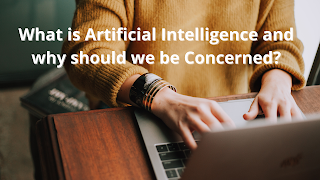What is Artificial Intelligence and why should we be Concerned?
What is artificial intelligence? Artificial intelligence (AI) is the power of a machine to do cognitive tasks, such as thinking and reasoning, in a manner similar to humans. AI has been around for decades and is now the driving force behind many advances in our society. We need to be concerned because AI can be dangerous if it is not managed and used correctly with proper foresight and caution. The potential dangers include misuse by malicious actors or accidental damage due to human error. In this article, you will learn about how AI works, What is AI, what its capabilities are, and why we should be concerned about it.
Here is a quick index to help you navigate the article:
What is Artificial intelligence?
What are the types of artificial intelligence?
*Based on Functionality
1. Reactive machines
2. Limited memory
3. Theory of minds
4. Self-awareness
*Based on Capabilities
1. Weak or narrow ai
2. General AI
3. Super AI
How Artificial Intelligence will affect our future
What are the benefits of artificial intelligence?
What are the risks associated with AI?
Why should we be concerned?
What is Artificial Intelligence?
Artificial Intelligence, or AI for short, is a term used to refer to the intelligence of a machine that has been programmed by people. Artificial Intelligence is an area that will continue to grow. AI is often thought of as something that can replace humans in their jobs. While AI cannot replace human intelligence, it does have the ability to perform tasks, such as speech recognition and speech synthesis, more quickly than people can. Many people are worried about the future of AI for this reason. They worry that soon robots or computers will take over what has traditionally been done by humans.
What Are the Types of Artificial Intelligence?
There are mainly two primary categories of artificial intelligence, with the primary classifications being based on functions and then based on the capabilities of AI. There are mainly two primary categories of artificial intelligence, with the primary classifications being based on functions and operations, and then based on the capabilities of AI. Based on functionality there are 4 types of AI and based on capability there are 3 types of AI.
Based on Functionality
Based on the functionality the 4 types of AI are as follows:
1. Reactive Machines
2. Limited memory
3. Theory of minds
4. Self-awareness
Based on Capabilities
based on capabilities the three types of AI are as follows
1. Weak or narrow AI
2. General AI
3. Super AI
How Artificial Intelligence Will Affect our Future
AI is short for Artificial Intelligence. AI is the branch of computer science which aims to make computers do things that seem intelligent. The goal is to create programs that can think, learn, and solve problems like people do. It sounds like a good idea, but there are some potential downsides to AI as well. There are many concerns about artificial intelligence. Some are concerned about the risk of losing human jobs to machines with powerful capabilities. Others worry about how we might use this technology in unethical ways. Still others fear that it could be used by governments or other organizations to control us. There's also concern over whether humans should even attempt to build an artificially intelligent machine.
What are the Benefits of Artificial Intelligence?
The use of artificial intelligence (AI) is on the rise. AI is simply an area of computer science that emphasizes the creation for computer systems that can simulate human intelligence. There are many benefits to AI, including faster search speeds, more efficient data processing, and decreased errors.
What are the Risks Associated with AI?
Artificial intelligence (AI) is the simulation of human intelligence processes by machines, especially computer systems. When machines are designed to learn from data or to act autonomously, they can be said to have artificial intelligence. After an AI system has been trained on a set of data, it will be able to make inferences about new data based on its 'experience' with the existing data. However, there are some concerns about how we will treat these machines once they become smarter than us. For example, if a robot becomes self-aware, would you want them to have free reign over your home? Or what happens when our robots start thinking like us?
Why Should We be Concerned?
Artificial intelligence is an advanced form of machine learning that enables computers to learn, respond to inputs, and make decisions without having been programmed. Computers are able to react in ways that they weren't programmed for which can cause some unintentional or unexpected outcomes. There are many concerns about artificial intelligence's capabilities and the implications it may have on human behavior and society in general. Some people believe AI will lead to a dystopian future where humans become obsolete while others think it could bring humanity into a new era of prosperity. The truth lies somewhere between these two extremes. It seems likely that as technology advances, so too does its ability to impact how we live and work.
Conclusion
A common misconception is that artificial intelligence (AI) is software that can think like humans. This is not true. AI can only provide information that an individual has provided to it, but cannot create the information itself. What is important for individuals to be aware of is that AI performs tasks much more efficiently than humans and for this reason, will soon replace humans in the workplace.
I believe you have found this article helpful to know about what is Artificial Intelligence and why should we be concerned. If you have further queries please share with us in the comment section below.
Author's online Info link: https://jonaidinfo.blogspot.com/

Comments
Post a Comment